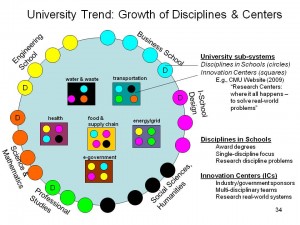Others, notably Dr. Loch Johnson, de facto dean of the intelligence scholars in the English language, have explored both definitions and concepts for a theory of intelligence. Others, such as Jack Davis, have done much in the area of analytic tradecraft or the “art” of intelligence analysis (to match the “art” in clandestine operations and covert action).
Now the time has come to develop a science of intelligence. The first casualty must of necessity be the obsession with secret sources and methods, secret agencies, and secret clients. Intelligence is about decision-support, plain and simple, and the new science of intelligence will be developed along the lines of the services science developed by Dr. Jim Spohrer of IBM, and others. Dr. Spohrer provided the below in an email exchange today:
(1) “you can have a science of anything, if a community agrees it is important”
(2) “innovations that are based on sciences, not just management and engineering practice, can be advanced more systematically”
(3) “industry cares about innovation acceleration, can academia deliver a science? does the engineering and management exist in practice”
(4) “academia said we can establish a research area to help build the science under the engineering and management practice.”
A round-table is being formed and a new article will result.




